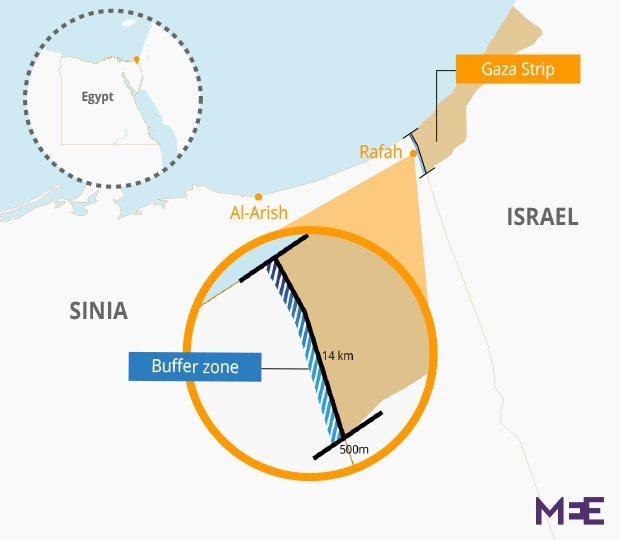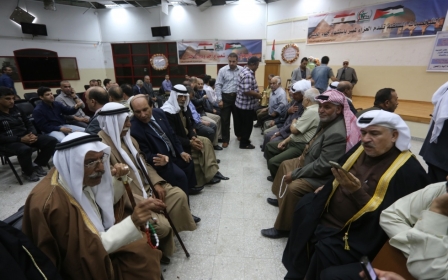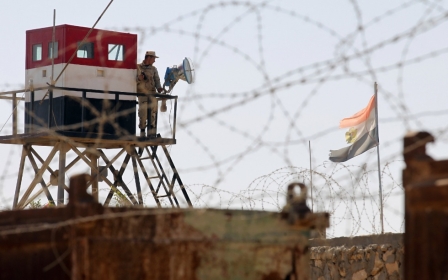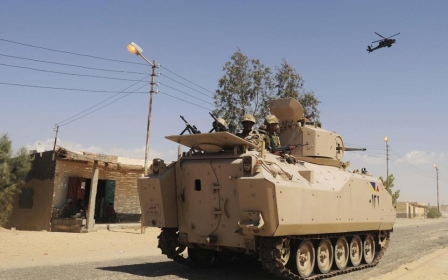Egypt evacuates homes near Gaza border for 'buffer zone'
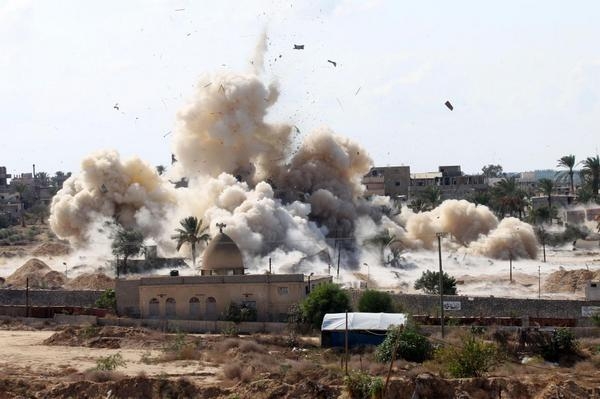
Egyptian authorities have begun evacuating homes in the northeastern city of Rafah to make way for a planned buffer zone between Egypt and the Gaza Strip, Egypt's state news agency reported on Wednesday.
"Residents living within 300 meters of the border were given a time limit for evacuating and relocating," a military official was quoted as saying.
He added that the move was aimed at "eliminating terrorist hubs and preventing terrorist elements from crossing the border."
A local resident said the inhabitants of homes within 300 meters of the border with the Gaza Strip had begun removing their belongings after Egyptian military officials gave them until Thursday evening to leave the area.
Another resident told MEE that locals fear the buffer zone - slated to be cleared of vegetation and structures - will completely change their way of life.
"One does not know how far this could reach," said Abu Taleb, a citrus and apple farmer. "This is the worst period in my 48 years in Sinai."
Abu Taleb was in the final process of picking his fruits when an emergency declaration was declared across the northern part of the Peninsula on Saturday. As a result of the declaration, he said truck drivers are afraid to approach the Peninsula and he worries that we will be stuck with rotten fruit.
Eyewitnesses reported seeing residents moving with their furniture and luggage.
A military official added that displaced Rafah residents would receive emergency funding to rent alternative housing until final compensation packages could be paid out.
Abdelfatah Harhour, the governor of north Sinai, told Egyptian TV programmed Alashira Masa'an on Wednesday that 65 percent of Sinai's residents in the buffer area have agreed to evacuate their homes in return for financial compensiation. Harhour said 29 percent of residents demanded new homes or land in the Sinai Peninsula city of al-Arish instead.
Two percent have refused to relocate to the areas allocated by the government, reported Egyptian news website Almarsad.
Military officials have said Wednesday's clearing is the first phase of a plan to create a 500-meter "buffer zone" along Egypt's 14km-long border with the Gaza Strip.
The Egyptian Defense Ministry said the decision to establish the buffer zone had been prompted by the "ability of criminal elements to dig [cross-border] tunnels from homes and fields and even places of worship [inside the Gaza Strip]."
The ministry added that cross-border tunnels between Egypt and the strip were the main way for "armed Takfiri groups to infiltrate Sinai to supply militants with arms, logistical assistance and shelter after staging their heinous attacks on the Egyptian army."
Na'im Gabr, a spokesman for North Sinai's Bedouin tribes, told Anadolu Agency that Rafah's local council had ordered the residents of 580 homes within 300 meters of the border to present their property deeds to local authorities, who said they would arrange compensation packages.
Speaking cautiously for fear of possible reprisal, a number of residents interviewed by AA confirmed that they had attended a meeting with a local official for an overview of the evacuation process.
The decision to create a buffer zone on the border with the Gaza Strip was made at two emergency meetings earlier this week by Egypt's National Defense Council and Supreme Military Council, held in the wake of a deadly attack by unknown perpetrators on an army checkpoint in the North Sinai town of Sheikh Zuweid.
At least 30 Egyptian troops were killed and dozens injured in the Friday attack.
The Egyptian government declared three days of national mourning following the incident, which constituted the deadliest attack on security personnel since last year's ouster of Mohamed Morsi – Egypt's first freely elected president – by the army.
Late Friday evening, President Abdel-Fattah al-Sisi imposed a three-month state of emergency in parts of North Sinai.
The following day, Egyptian authorities closed the Rafah border crossing linking Egypt's Sinai Peninsula to the Gaza Strip.
Al-Sisi told Egyptian state television on Saturday that he would take measures on the border with the Gaza Strip in order to "totally eradicate terrorism".
New MEE newsletter: Jerusalem Dispatch
Sign up to get the latest insights and analysis on Israel-Palestine, alongside Turkey Unpacked and other MEE newsletters
Middle East Eye delivers independent and unrivalled coverage and analysis of the Middle East, North Africa and beyond. To learn more about republishing this content and the associated fees, please fill out this form. More about MEE can be found here.


